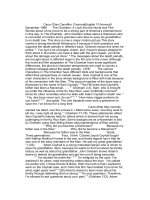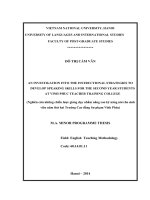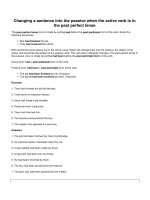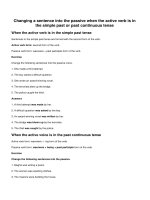falling into the hot trap
Bạn đang xem bản rút gọn của tài liệu. Xem và tải ngay bản đầy đủ của tài liệu tại đây (44.43 KB, 3 trang )
The reality television series, "Are You Hot? The Search For America's Sexiest People" is shallow
and dangerous. The whole idea of this eye-candy-fest is to find the two newest "sex symbols" in
America, with the only criteria being how "hot" they look. From four different regions of the
country called "hot-zones," [Are You Hot] every narcissist in America gathers together to be
evaluated in front of three judges on their body, face, and sex appeal. One judge even uses a laser
pointer to draw attention to any imperfection on a contestants' body. Meanwhile, I (and probably
many other average teenagers) am sitting at home subconsciously measuring myself up to these
wanna-be models and I realize that I don't like the way I'm feeling; this can't be healthy. Seeing the
judges put down people who are already close to perfect really made me question myself. I feel
that "Are You Hot" is mentally, physically, and monetarily destructive to young women. It leads
them to obsess over their appearance, and can be damaging in the following ways:
Standing up on a stage in front of millions of viewers and being told "You are not hot enough," is
mentally harmful to a person. This kind of rejection is many people's greatest fear. It damages
one's self confidence and self worth and it shouldn't because appearance is just a small fraction
that makes up a person. The show's viewers are also victims of rejection because they
subconsciously compare their own bodies to the ones on TV. "Are You Hot" completely alters a
young woman's conceptions of what is normal; creating a false image of what she should look like.
It's hard enough growing into a young adult, trying to figure out who you are and feel comfortable
with your body without having to worry about conforming to the American stereotype of a young
woman.
The beautiful women we see on TV are what many American girls view as ideal and therefore
aspire to look like. Obsessing over appearance can be physically damaging to a young women's
health because it can lead to trying to change the way her body looks. There are many dangerous
things one can do in an attempt to change their own body to look more like the stereotype "hot"
bodies seen on "Are You Hot."
One way is to have breast augmentation surgery. This surgery carries many complications and far
too many risks to list. They range anywhere from capsular-contracture or deflation to nerve
damage or calcium deposit lumps which are often mistaken for cancer and lead to additional
surgery to remove the implant and distinguish the deposits from cancer. [FDA par. 6] In addition,
breast implants have a limited life and are very expensive to replace. "I tell my patients that the
implant is on a loan," says Gregory O. Dick, M.D., a plastic and reconstructive surgeon at Shady
Grove Hospital in Rockville, Maryland. "They can enjoy it for six weeks or six years or sixty
years." [FDA par. 13] If you choose to, or must have your implants removed, you may experience
puckering, wrinkling, sagging, or other changes of the breast. Implants may also affect your ability
to produce milk for breast-feeding. [FDA par. 22] Lets put it this way, there are far more risks
than benefits to a breast augmentation surgery.
Plastic surgery and liposuction are two other dangerous selections. According to Dr. Todorov of
the Smart Skin Care Site, complications do occur, ranging anywhere from scarring to fatalities.
[Smart Skin Care par. 2] Being beautiful shouldn't mean risking your life just to feel better about
yourself.
Martha Irvine, a writer for the Chicago Press responded to the show saying, "Some experts believe
the trend further encourages negative body image and eating disorders that young people, in
particular, already struggle with." Eating disorders are very common among young women,
particularly teens. [Collier Schools par. 6] I speak from personal experience on this issue because
about a year ago became bulimic. Watching certain TV shows and looking at magazines like
Victoria's Secret assisted in convincing me that I was too fat. I would routinely force myself to
throw up anything I ate, even if it was only one bite. Eventually I popped a blood vessel in my
right eye from vomiting so much. When I saw the looks of worry and disappointment on the faces
of my loved ones, I knew then and there that it just wasn't worth it. Over time, I became stronger
and learned to accept my body as God created it. Sadly, it is not that easy for most victims of
eating disorders. I was lucky enough to have support from family and friends and I wasn't as
severely bulimic as I could have been. Many girls are not strong enough to pull themselves out of
an eating disorder and end up facing serious sickness or sometimes even death.
Jane Fleming, executive director of the Renfrew Center Foundation, a national nonprofit
organization that addresses the issue of eating disorders said, "We keep telling our kids, 'You're
more than your bodies.' But that's not the message they're seeing on television and in magazines."
[Collier Schools par. 8] She is absolutely right. "Are You Hot" sends the message that appearance
is everything. We must learn to ignore this message and not fall into the dangerous trap of eating
disorders.
It is very expensive for a young woman to spend her life constantly trying to perfect her body.
According to the San Francisco Plastic Surgery and Laser Center, the estimated fee of a face-lift
ranges between $11,000-14,000. [SFPSLC] A cheek lift is about $4,500, nose-reshaping ranges
between $3,500-7,500, breast augmentation between $5,600-7,500, and liposuction on the thighs
or stomach is about $2,600-6,500. [SFPSLC]
Wanting to look like the women on TV is monetarily destructive because spending too much
money on your looks can take away from spending money on more important and necessary
things. In addition, spending too much time on your looks can take away from spending time on
anything else that might need attention, like building brains and character. The young women on
"Are You Hot" are the kind of people who will never stop looking for any kind of imperfections
on their bodies. But the sad thing is that their looks are all they have. Only two out of the
thousands that tried will be able to claim the title of being the "Sexiest People in America." [Are
You Hot] But will this title stop them from obsessing over their appearance? Of course not! Their
egos are only going to grow and I don't even want to imagine what the thousands of rejects are
going to do to themselves now that they've been told they aren't hot enough. It's bad enough that
insecure viewers at home see these beautiful women getting told their legs (that look like my
wrists) are too voluptuous.
Author Steve Jeffes is a graduate of the University of Pennsylvania and has appeared on several
national radio programs debating the issue of appearance discrimination. Jeffes disagrees that
obsessing over appearance is damaging. [Jeffes 12] In his book "Appearance is Everything," he
discusses how "it is not enough to be 'average' looking. In fact, in many instances this is just as
bad as being 'unattractive.'" [14] His book looks at cover stories and features of popular
magazines and shows how the themes of "beauty" are strongly reinforced as cultural facts. Jeffes
also discusses how our concepts of beauty have changed dramatically over the past 100 years,
leading to evidence that culture and media are strong influential factors on what we "see" and
what we infer about character from each other's appearance. [8] Jeffes says, "persons who are
attractive have a distinct advantage in obtaining success, wealth, power and advances in life over
equally qualified, unattractive persons. You should act, dress, and appear like the people you
desire to look like." [45]
In response to Jeffes opinions, I agree that culture and media are both influential factors on what
we base our own appearance on, but I must disagree completely that appearance is everything and
being average means looking unattractive. There is far more to a human being than what meets the
eye. True beauty lies within and should not be obtained through means of surgery and eating
disorders. If a person is well educated (attractive or not) they can do just fine in obtaining success,
wealth, and power. Take chairman and chief software architect of the Microsoft Corporation, Bill
Gates for example. He used to his intellect to become one of the most successful people in the
world, despite his "average" looks. He attended college at Harvard and didn't worry about his
appearance getting in the way of his goal that 'one day the computer would be a valuable tool on
every office desktop and in every home.' [Microsoft par. 5] I know many successful people that
are unattractive or average looking. "Are You Hot" demonstrates the same idea as Jeffes book that
appearance is everything. This idea is ridiculous. Thin legs and perky breasts don't stay with a
person nearly as long as do brains and character.
"Are You Hot" encourages young women to become fixated on their looks, which is damaging to
an individual in three ways. It is mentally, physically, and monetarily destructive. It is sad to see
the oversized-egos of contestants on the show strutting around with a "tell me I'm beautiful" look
in their faces while probably starving inside. They are shallow enough to believe that they are the
sexiest person in America. Some quotes from one episode that left me in complete astonishment
were "I'm ridiculously good-looking," "Just look at me I'm flawless," and "You have before you
a physical incarnation of a goddess." [Are You Hot] The show never specifies what exactly the
people win, but I can only pray for a reality check, or at the very least, a full-length mirror. As for
the rest of the average American girls watching, I urge them to be strong and not fall into the trap
of personal appearance obsession.
Bibliography/Works Cited:
ABC's "Are You Hot? The Search For America's Sexiest People." the Reality TV Show. [Are You
Hot]
Bill Gates Home. "Bill Gates, Microsoft Chairman and Chief Software Architect." Microsoft.com.
September 2002 < [Microsoft]
Bren, Linda. "Saline Breast Implants Stay On Market As Experts Warn About Risks." U.S. Food
and Drug Administration. July-August 2000.
/>[FDA]
Collier Schools Online "Television Relates to Eating Disorders." Collierschools.com. February
2003. < [Collier Schools]
Jeffes, Steve. "Appearance is Everything." Philadelphia: Sterling House Pub. 1998
San Francisco Plastic Surgery and Laser Center. "Cost of Procedures." SFPSLC Medical
Corporation. 27 Novermber 2002
< />[SFPSLC]
The Smart Skin Care Site. "Risks and Benefits of Plastic Surgery-Plastic Surgery Facts."
< />[Smart Skin Care]









